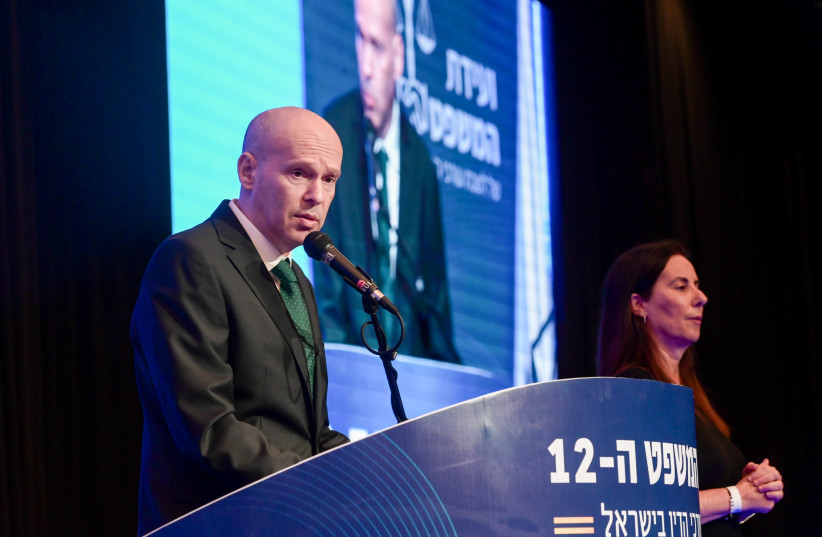Efforts that harm the independence of the judicial system will also impact the IDF and national security, Military Advocate General Yifat Tomer-Yerushalami said at the 12th annual Israel Bar Association Conference on Monday.
Tomer-Yerushalami took the podium as part of a line-up of speakers including former attorney-general Avichai Mendelblit, State Attorney Amit Aisman, and Public Defender Anat Meyassed-Cnaan, all whom touched upon the challenges of the judicial reform.
Tomer-Yerushalmi said that the IDF’s international legitimacy was predicated on an independent judicial system that had made rulings and opinions that addressed issues such as open-fire procedures and security barriers.
Without the independence of the judicial system, IDF soldiers and officers may be endangered before international legal forums.
“There are those that say that the Supreme Court hinders the IDF; the opposite is true,” said Tomer-Yerushalmi.

Mandelblit said that the independence of the judicial system was a legal “Iron Dome” for Israel on the international stage, both against those that sought to harm the state at international legal forums, and made partners more willing to work with it.
The former attorney-general emphasized the problems of the reasonableness standard law, for which a hearing is set next Tuesday.
The reasonableness standard is no less important than the Judicial Selection Committee because it will allow the appointment political government legal advisers, former attorney-general Mandelblit warned.
The July 24 reasonableness standard law, which restricted the Supreme Court’s ability to engage in judicial review of government and ministerial administrative decisions, would allow the coalition to appoint unreasonable and even corrupt officials, said Mandelblit.
The former attorney-general said that the government no longer needed to split the role of the Attorney-General’s Office into new positions or reduce the powers of government legal advisers, because without the requirement to act reasonably political loyalists could be appointed in their stead. Loyalist State Attorneys and Attorney-Generals could interfere in serious legal cases.
“The cancellation of the reason for reasonableness is, therefore, no less serious than the attempt to appoint ‘political’ judges,” said Mandelblit.
Bar Association chairman Amit Becher said that the country was facing attempts to weaken legal authorities and law enforcement officials. Becher said that the role of the Bar was to fight on behalf of rule of law and to educate the public. Israel was already facing a constitutional crisis, with ministers saying that they may not abide by Supreme Court rulings on the reasonableness law. September has three major court rulings scheduled connected to judicial reform.
Religious Zionist Party MK and judicial reform architect Simcha Rothman was asked during a panel if he would accept the rulings of the court on judicial reform legislation.
"I think that in a country of law everyone, and I mean everyone, should respect the law," Rothman responded. "It will be a sad day if the judicial institution acts contrary to the law. If the court is bound to the law, I will respect every ruling of a law-bound court."
Rothman was accused of an evasive answer, and was shouted down with calls of "shame." The rest of the panel on the Judicial Selection Committee descended into chaos, with constant interruptions and heckling of Rothman. Rothman said that the crowd's reaction was an example of the political bullying that had afflicted society of late.
"There are people in the audience who will bully me and try to shut me up, and that is not democratic," said Rothman.
Almost the entire audience was on its feet at some points, some Bar members waving Israeli flags in what appeared to have been a prepared protest.
Aisman addressed the street protests that had rocked the state since the beginning of the year, assuring that the State Attorney’s Office was not seeking to stifle the right to demonstrate. Criminal proceedings were launched against lawbreakers, and the office would also work against police officers that used excessive force. He said that his office would work for citizens on all side of the judicial reform debate, prosecuting anyone that broke the law. Aisman said that his office didn’t work on behalf of the coalition or the opposition, but according to the law.
Police Chief Kobi Shabtai addressed the Saturday night Eritrean riots in south Tel Aviv his speech, saying that the event had crossed red lines. The rioters had used improvised weapons and put officers in danger. 62 officers were hurt in the violence.
Shabtai expressed reservation over the new committee that had been established to review the police use of spyware, saying that it was troubling that it would have the powers of an investigation body.
Public Defender Anat Meyassed-Cnaan attacked some of the new law enforcement measures introduced by the government, saying that the pursuit of legislation on death sentences and more expansive search powers were draconian. The public defender also raised the issue of the fast deterioration of the prison system, which suffered from overcrowding and subsequently poor conditions for inmates.
The Arab sector crime wave was also discussed during the Bar Association panels. Aisman said that his office was working with the police to bring down crime organization infrastructure.
"Crime in the Arab community isn't just a problem for the Arab community, it's a problem for the rest of Israeli society," said Aisman.
